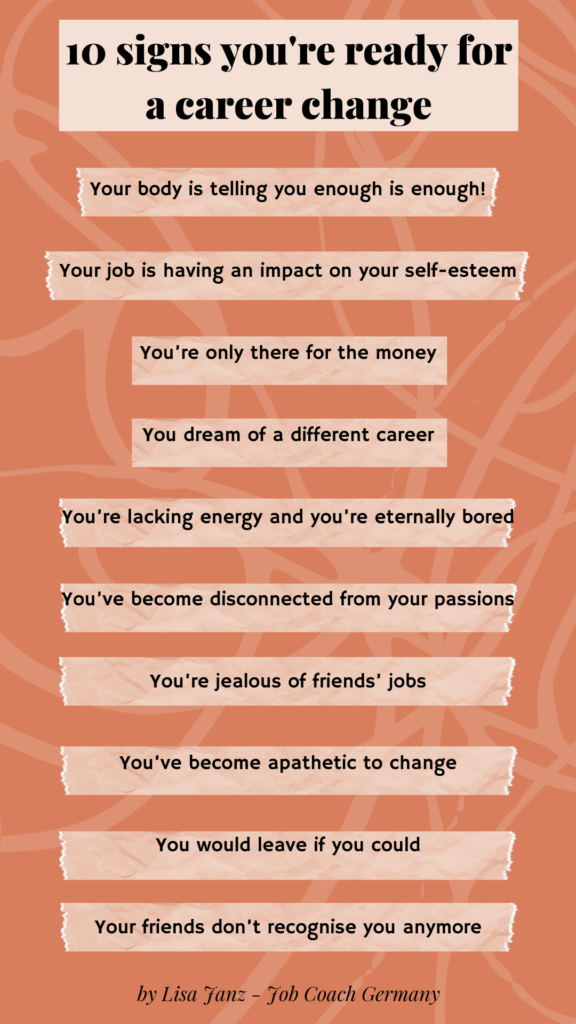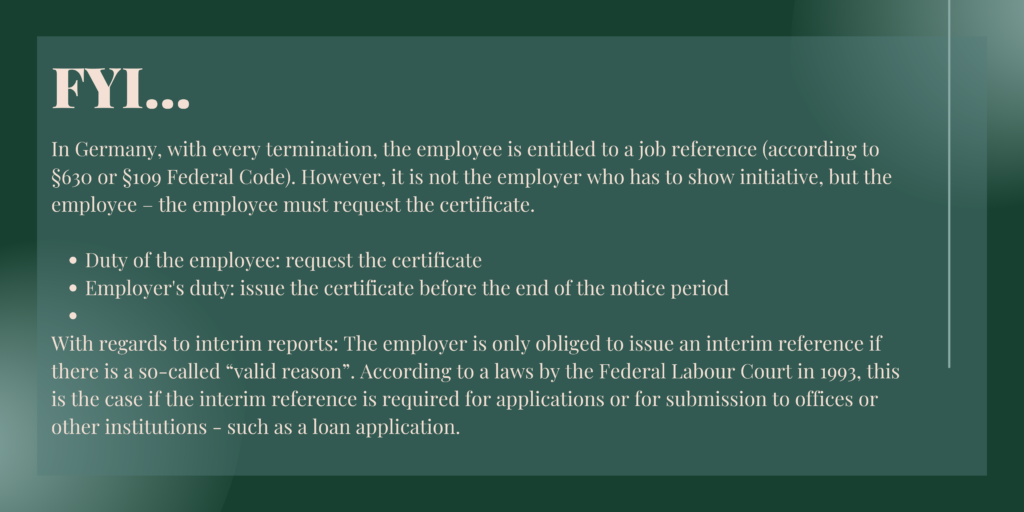🥁🥁 It’s my first ever guest post!!
I started to draft a post about quitting your job in Germany and finding a new one and I dropped Lisa a short email to ask if she wouldn’t mind sharing a few tips on how to do this. However, I quickly realised that it should be Lisa writing the whole post since she is a literal job expert in Germany!
She graciously accepted so below you will find my first ever guest blog post by Lisa Janz – Job Coach Germany!
But just before you dive into the post, you can catch up on our Instagram Live from Wednesday 10th November RIGHT HERE ⬇⬇
Leaving your former job behind and
finding a new opportunity
Did you know that according to the Institut für Arbeitsmarkt- und Berufsforschung (Institute for Employment Research), German employees spend an average of 10.8 years in the same job? German job experts, however, recommend changing jobs after three to five, but no later than seven years. Elsewhere in the world, this time frame is even shorter.
According to several studies and polls, US employees receive a 10-20% salary increase when moving jobs every 1-3 years, compared to the average 3% increase long-term employees receive. They also increase their career opportunities by gaining new responsibilities and skills.
What I realised when working abroad
When I started working in England, I quickly realised that changing jobs more regularly seemed to be beneficial to your career. As many of my colleagues told me, this was the way to get promotions and higher salaries. I was so confused.
In Germany, we practised the exact opposite: a permanent employment contract is the main goal for every worker in Germany and if you stay with one employer for 10 years or more you’re considered a loyal and reliable employee. At least, that’s what I had been told and what I had experienced thus far. The companies that I used to work for even had unwritten rules whereby people who left the company, especially for a competitor, were treated as traitors and were never allowed to return to the company again.
In England, my colleagues moved on to other job opportunities with competitors all the time. And guess what, they often came back after 2-3 years and even got a promotion and a higher salary. I really didn’t understand what was going on. But obviously, that got me thinking. Today, I’m convinced it’s better to change your position, and even employers regularly. It can be a great advantage for each individual career path. The number of times you should change jobs typically depends on your needs and preferences for your role. You should change careers when you feel you’re ready to work in a different position that feels more challenging or fulfilling.
Patchwork résumés are becoming the new normal
Especially in these uncertain times, patchwork résumés are becoming more common. This is a development that scares many people because they primarily long for financial security and routine. But even experts rate this trend positively. They recommend changing your job after five to seven years at the latest because every job is subject to a cycle that runs in seven phases.
However, this hides the fact that it is becoming more and more difficult, especially for young professionals, to get hold of a permanent employment contract. There are also major industry differences. While fixed-term employment contracts are becoming obsolete again in areas with a shortage of skilled workers (engineering, software development, IT, health care, etc.), employees in overcrowded industries, such as marketing or advertising agencies, often have extensive patchwork résumés with a considerable number of short-term jobs, internships, or trainee positions.
The 7 phases of the employment cycle
Don’t give the power over your job cycle to the employer or the labour market. If you actively plan your career, you will climb the career ladder faster and higher. According to Jörg Stegemann, a German-French recruitment consultant, we can observe the following seven phases in every employment cycle:

1. Enthusiasm
Regardless of whether you have been looking for a job for a long time or have been approached by a head-hunter: There is magic in every beginning and therefore you usually start your new job highly motivated, full of anticipation and also a little excited.
2. Melancholy
If after the first one or two months reality hits you and you realise your high expectations may not have been (completely) met, many people are first of all looking to the past. They doubt whether changing jobs was the right decision and tend to romanticise the previous job. Somehow the colleagues were nicer, the tasks more demanding and the boss wasn’t that bad after all. Melancholy is normal – don’t let it overwhelm you!
3. Settling in
At some point, your mood will balance out and you will begin to settle in your new professional home. You make new friends, familiarise yourself with your tasks and take on a little more responsibility. At this point, the motivation sets in again and you want to present yourself from your best side. This third phase lasts for about a year.
4. Stability
After the first year, you are finally properly trained and have already earned respect from colleagues and superiors through your excellent performance. You are at a good, but not an outstanding level. After the exhausting first year and the numerous changes, it is time to take a deep breath and find stability.
5. Best performance
Things are looking up again in the fifth phase, which begins around the third year. You are now established in the company, feel at home and do your work routinely. Now you want more and you are on top form. This fifth phase lasts for several months to years and often means advancement in the organisational hierarchy. This phase is rarely observed for more than five years.
6. Turning point
Your performance declines, the first doubts or conflicts arise with teammates or superiors. You no longer feel 100% comfortable in your job, long for change or feel trapped in stagnation and there is a lack of new challenges. Now is the best time to change jobs. However, many people still hesitate out of fear of uncertainty or they see the sixth phase as a temporary hangover.
7. Downward spiral
However, if you do not pull the emergency brake in the sixth phase and manage to jump, you embark on a dangerous downward spiral. This often leads to psychological and physical problems, a decline in performance, burnout or other stress-related illnesses. At the end of the seventh phase, you will be forced to change jobs, maybe due to illness or even termination by the employer.
Always keep an eye on which phase you are currently in and look for a new job from phase 6 (turning point) onwards.
Signs you’re ready for a career change
Are you ready for a change in your work life? If some of the following points seem familiar, you might want to consider a change in your career:
- Your body is telling you enough is enough!
- Your job is having an impact on your self-esteem
- You’re only there for the money
- You dream of a different career
- You’re lacking energy and you’re eternally bored
- You’ve become disconnected from your passions
- You’re jealous of friends’ jobs
- You’ve become apathetic to change
- You would leave if you could
- Your friends don’t recognise you anymore
Do some of these points describe your current situation?
Please don’t panic or get overwhelmed! Breathe in…..and out…
You’ve just found out that you are ready for the next step in your career. What you make of this result is entirely up to you. You don’t have to switch careers if you don’t want to and you can stop reading this article now. However, if you’ve made up your mind to look for a new job, please read the guide below.

A step-by-step guide on landing your next career opportunity.
1. Evaluate your current situation
Make a list of what you like and dislike about your current role. Moreover, write down what you’ve liked about any other previous employers. Check the reasons why you want to leave. Sometimes, it’s not necessary to leave the employer, but perhaps to search for a new opportunity in a different department/new role.
Hint: If you start looking for a job even though you are still employed by another company, you need to keep the application secret. Otherwise, it can become a reason for termination. However, you want to avoid gaps in your résumé if possible. The smoother the transition from one job to the next, the better. You can ask for confidentiality in your application. Also, before you start applying, check your current work contract and find out about your notice period (some contracts are very tricky).
Additional tip: Be sure to request an interim report (like a job reference) at regular intervals at your current employer. So you are always ready for an application.

2. Define your ideal career profile
Assess your interests, values, and skills. You might want to think about upgrading your skills or even finding a mentor in your field. Furthermore, I recommend that you define your goals – not only for the job search but more importantly for your long-term career.
3. Search for a new job
Be very open and consider alternative careers. Research different job opportunities on different job boards (general & industry-specific), expand your network, update your application documents & build your personal brand.
4. The job interview
During the job interviews, think about the company benefits that you’re receiving from your current employer (e.g. “Betriebliche Berufsunfähigkeitsversicherung” – Occupational Disability Insurance) and whether your new employer would be willing to continue to pay that. You can negotiate that during the interview.
5. Job offer
Once you’ve received a new offer from another company, it’ll give you leverage to negotiate your salary (or even your position/tasks/responsibilities) with your current employer. Would a higher salary change your current situation?
6. Termination
Hand in your notice. Get some rest to realise the process that you’re going through right now. Maybe take the rest of your annual leave to fill up your energy tanks before starting your new job. This is actually a good idea as you normally don’t take any annual leave with your new employer for the duration of the probationary period.
7. Probationary period
This is typically between 3-6 months here in Germany. Use this time to find out whether the new employer really lives up to everything they have promised you during the job interview. Do you like your tasks, team, boss, customers, stakeholders, etc.? This time is for you to find out whether the new employer is the right fit for you.
You don’t have to do the career move on your own – especially if you’re searching for a job here in Germany. My 12-week coaching program called My Dream Career In Germany might be the right start for you.
Lisa Janz
JobCoachGermany
http://www.linkedin.com/in/jobcoachgermany
https://www.instagram.com/lisa_janz_jobcoachgermany/
https://www.facebook.com/JobCoachGermany/

Pingback: Working in Germany in English: 8 pros and cons you have to know! - Adventures of Steffi